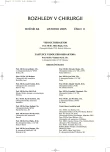Surgery in the Elderly
Příspěvek k chirurgii vyššího věku
Jsme svědky nárůstu věku operovaných ve skupině do 65 let věku a dokonce nad 85 let. Operační riziko roste v důsledku věkových změn v oběhovém, dýchacím, neurovegetativním a vylučovacím systému. Funkční kapacita uvedených systémů s věkem je redukována a snižuje se schopnost reagovat na zátěž. Užití anestetik a jejich vliv na cholinergické spoje, zátěž vyplývající ze ztrát krve, hypoxie, hyperkapnie vedou k následným psychickým pooperačním změnám. Vedle nich změny v regulaci vodního a elektrolytového metabolismu spolu se změnami v teplotě, infekce a poruchy funkcí ledvin vedou k dalším těžkým celkovým stavům včetně delirantních. V našem článku chceme poukázat na vliv celkové péče a péče perioperační a anestezie. Možnost kombinované anestezie s formami místní anestezie v chirurgii břicha ve vyšším věku mohou přispět k snížení morbidity a mortality v této věkové kategorii.
Klíčová slova:
patofyziologie vyššího věku – chirurgie ve vyšším věku – anestezie ve vyšším věku
Authors:
J. Šváb
Authors‘ workplace:
I. chirurgická klinika 1. LF UK a VFN v Praze, přednosta doc. MUDr. J. Šváb, CSc.
Published in:
Rozhl. Chir., 2005, roč. 84, č. 11, s. 552-556.
Category:
Monothematic special - Original
Overview
Among the steadily increasing population of surgical older patients than 65 yr are the fast growing group about 85 yr and older. Postoperative averse effects on the cardiac, pulmonary, cerebral and urinary systems are the main concerns for elderly surgical patients who are at high risk. The function capacity of organs reduces with age, resulting in decreased reserve and ability to endure stress. The effect of anesthetics on postoperative delirium has been studied and a leasing hyposthesis has been that offending druha aggravate an age-associated central cholinergic insufficiency. In additional to being linked to narcotics, sedative, and anticholinergics, delirium has been associated with urinary tract infection, pneumonia, hypoxia or hypercarbia, fever, blood loss, and electrolyte disturbances. In this review, we document the incidence of postoperative averse outcomes and discuss way of improving perioperative anaesthesia care for this vulnerable surgical population. There is present possibility anaesthesia in elderly.
Key words:
age functional factors – surgery in elderly – anaesthesia in elderly
Labels
Surgery Orthopaedics Trauma surgeryArticle was published in
Perspectives in Surgery

2005 Issue 11
- Possibilities of Using Metamizole in the Treatment of Acute Primary Headaches
- Metamizole vs. Tramadol in Postoperative Analgesia
- Spasmolytic Effect of Metamizole
- Metamizole at a Glance and in Practice – Effective Non-Opioid Analgesic for All Ages
-
All articles in this issue
- Surgical Complications of Laparoscopic Colectomy in Patients with Colorectal Carcinomas
- Small Bowel Perforation as a Late Complication after Laparoscopic Hernioplasty
- Retromuscular Mesh Repair of a Hernia in a Scar According to Rives – Our First Experience
- Giant Retroperitoneal Liposarkomas
- Surgery in the Elderly
- Fast Track in Surgery
- Management of Pseudoarthrosis of the Navicular Bone of the Wrist Using the Synthes 3.0
- Treatment of Iatrogenic Bile Duct Lesions from Laparoscopic Cholecystectomy
- Management of Infection after Aorto-femoral Arterial Reconstruction
- Laparoscopic Management of an Infected Oesophageal Cyst
- Comparison Study on the Use of Tubular and Spiral Thoracic Drains Following Lung Resections. A Prospective Study
- Perspectives in Surgery
- Journal archive
- Current issue
- About the journal
Most read in this issue
- Retromuscular Mesh Repair of a Hernia in a Scar According to Rives – Our First Experience
- Small Bowel Perforation as a Late Complication after Laparoscopic Hernioplasty
- Fast Track in Surgery
- Management of Pseudoarthrosis of the Navicular Bone of the Wrist Using the Synthes 3.0
